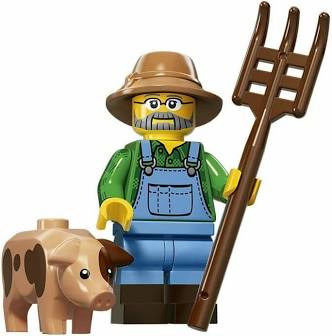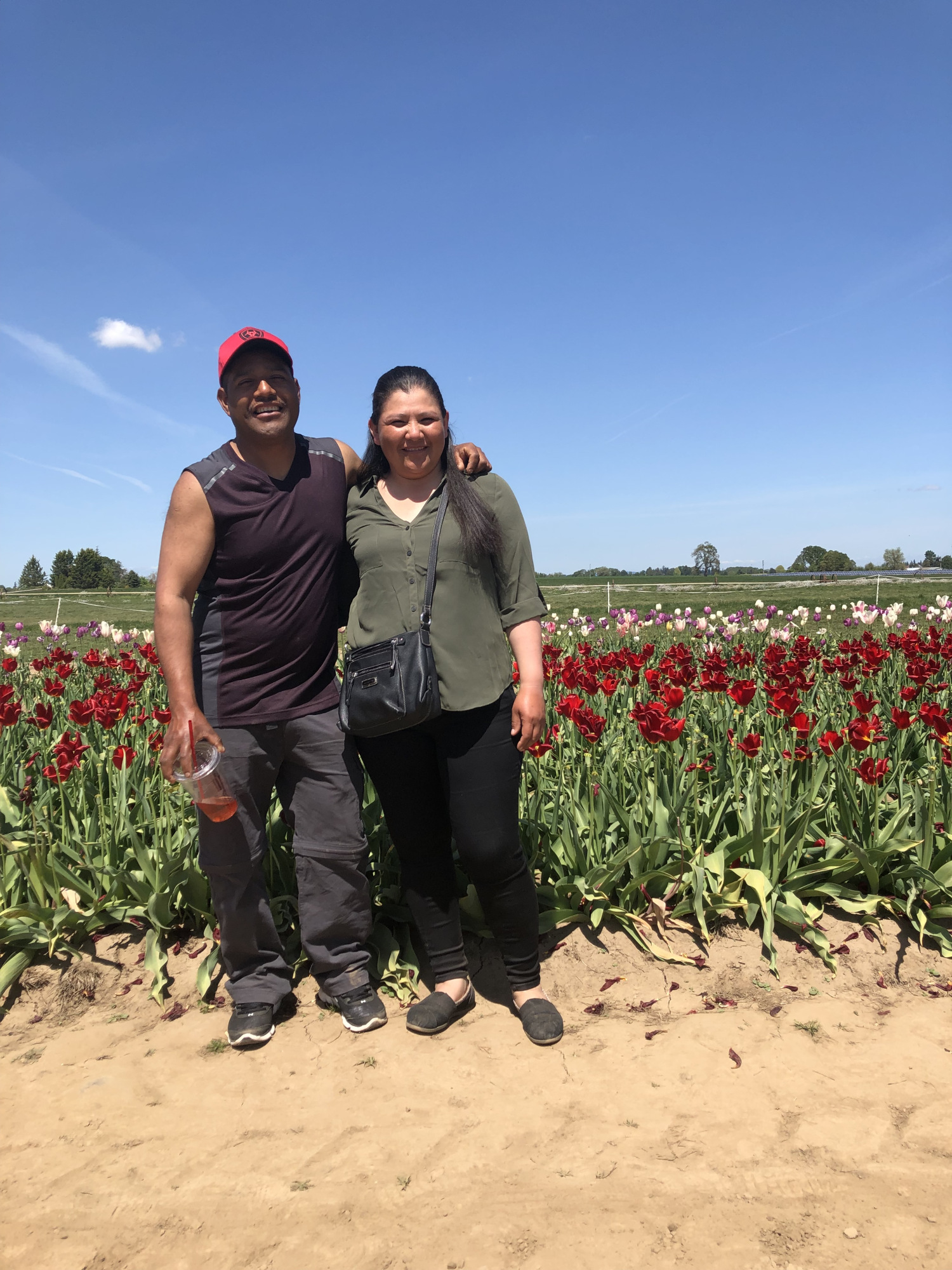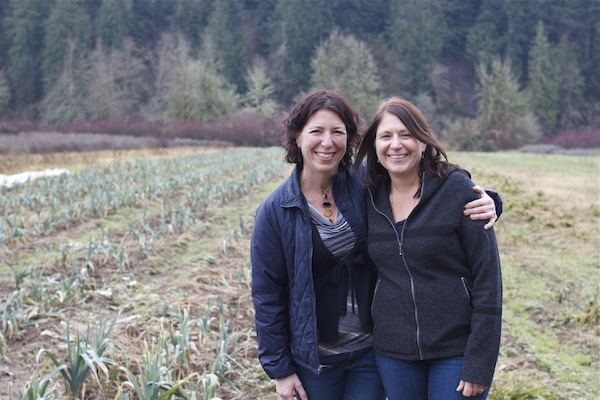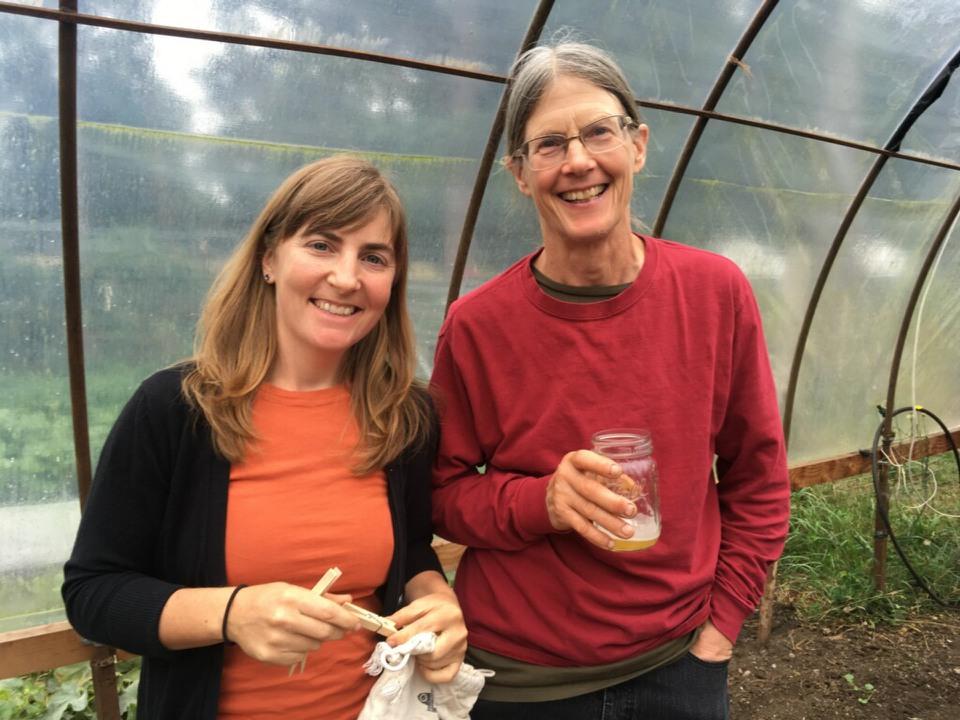Growing Diversity: A Fresh Look at Farmers
 This is the farmer that comes in a Lego farm set. Here in Thurston county however, your farmer is nearly as likely to be female. The most recent Census of Agriculture in 2017 shows that 46% of Thurston county farmers are women. Globally the United Nations Food and Agriculture Organization estimates that 43% of farmers are women, however it is probably higher, as women are less likely to call themselves farmers, despite doing a variety of farm tasks including animal care, family management, and quality control, as well as field work.
This is the farmer that comes in a Lego farm set. Here in Thurston county however, your farmer is nearly as likely to be female. The most recent Census of Agriculture in 2017 shows that 46% of Thurston county farmers are women. Globally the United Nations Food and Agriculture Organization estimates that 43% of farmers are women, however it is probably higher, as women are less likely to call themselves farmers, despite doing a variety of farm tasks including animal care, family management, and quality control, as well as field work.
In Equal Exchange blog, https://blog.equalexchange.coop/who-is-the-farmer/, Emily Gove points out that “perpetuating the stereotype of the white male farmer not only leads to generalizations, but also prevents the experiences of others from being shared and accepted. This stereotype becomes a powerful representative for a diverse group, which actually includes all genders, ages, and races.”
Dr. Monica White states in her book, Freedom Farmers, http://monicamariewhite.com/freedom-farmers/, “this tendency of gendering the farmer with capital ownership — white men are often the owners and operators of capital to which other groups have been denied access. Those denied groups’ responsibilities, though essential to the successful operation of a family farm, are distanced from the farm and the capital it represents.”
Banana farmer Cecilia Manzanillas, of AsoGuabo cooperative in Ecuador, says that “when families and communities invest in and support individuals, those individuals will both flourish and continue the cycle by giving back to the communities who supported them.” I got to see this first hand through speaking with Virginia Herrera and Ann Huster of Eloisa Organic Farm LLC in Albany, Oregon. The farm sells produce through their CSA, at farmers markets, to restaurants, and to wholesale distributor Organically Grown Company. You will find their delicious organic produce on our shelves at the Olympia Food Co-op. They were kind enough to spend time talking with me during this very busy time for farmers.
Both Ann and Virginia worked on Spring Hill farm, Ann for 16 years, Virginia for over 20. When Spring Hill Farm owner, Jamie Kitzrow, was ready to retire, he offered the farm to two family groups. Brothers Paulo and Floriberto Martinez with their wives, Gladis and Leanilda started Sunrise Farm. Virginia and her husband, Zenon Ramirez, started Eloisa Farm. They are originally from the village of Asuncion Atoyaquillo in Oaxaca, Mexico. After farming in the United States for 25 years, they were excited to make their long-term dream of going into business for themselves come true. Jamie gave Virginia good terms and helped her ease into her business. The first year he sold her tomatoes under his label. The next year Virginia sold tomatoes under her name at his stand. The following year they got all their certifications and sold their own produce.
It hasn’t been easy; there have been and still are many challenges. While Virginia’s English is improving, speaking on the phone is more difficult than a face-to-face conversation and reading legal documents in English can be very confusing. They were unable to access many of the financial supports that were available to US born farmers. They have had to rely on loans from family members and friends, just keeping ahead of costs. Every certification has costs associated and of course farming needs a lot of output prior to harvesting at the end of summer. Fortunately, many of Spring Hill’s marketing venues followed Eloisa. After all, the same people were working the farm on the same land. First Alternative Natural Foods Co-op, which has two stores in Corvalis, were very supportive and came to the farm when Virginia first leased it. They said they’d buy her produce and have been a steady customer ever since.
There were also unexpected challenges, like COVID19 and massive forest fires. Smoke-filled air makes field work dangerous and many employees chose not to work when the air quality was bad. Ash got into everything; think about all the crinkles in lacinato kale. Vegetables needed repeated washings, as did the baskets and equipment, creating a lot of extra labor costs. Many parents have had to stay home with their children during the pandemic. Employees had concerns about working safely and are having to decide what they are comfortable with. This has made labor difficult to find, on the farm, for the market stall and in the packing shed. Ann says they like giving people the opportunity to learn new skills and hopefully they will stick with us.
Fortunately, Virginia’s family is very supportive. She has two young adult children who help with the market, with keeping food in the fridge, the house clean and Virginia’s youngest son cared for. The farm is a team effort. Ann says that Virginia is a good cook. “When I have the time,” Virginia laughs. She likes doing supportive things for her employees. She provides a lunch allowance for employees who work at the market stand. She buys hot lunch for the field workers every Friday from her good friend, Lízbeth Medina, from her food truck, Majahua Authentic Mexican Food. Lizbeth worked at Spring Hill Farm with Virginia and now she and her husband are venturing into this new business and Virginia wants to support them. Virginia says that she likes to do things to keep her workers excited and happy. “In the past I was the employee, I know that work in the field is very hard. I was very tired at the end of the day.”
Ann says that one of the reasons Virginia and Zenon are successful is because they are willing to try new things; they are open to learning, trying new planting schedules and new ways to pack. They don’t say this is how we’re going to do it because this is how we’ve always done it. Virginia shared some ingredients for successfully starting a new business, “Have a dream, think big, plan, save money, find good employees, network, talk to other people and be open to new experiences.” She and Zenon are proud to be a part of their community, serving and feeding their friends and neighbors. They give left over vegetables from the market and on the farm to gleaners groups. The farm is named after Virginia’s mother, Eloisa, to honor her hard work and dedication in raising nine children by herself after Virginia’s father died when she was six.
Tony A. from Portland offers this review on Yelp: Eloisa Organic Farm is among the best, if not the best, produce stands at the Saturday morning Portland Farmers Market at PSU. Before the market rings its 8:30 a.m. starting bell, dozens of regulars are already lining up, properly socially distancing, waiting to purchase Eloisa’s excellent produce. Customers stop at a disinfectant station, where they are asked to wash their hands and put on plastic gloves. We’ve been purchasing produce from this farm for years. We love all of their vegetables, and particularly their basil, cucumbers, eggplants, peppers, leeks, several kinds of lettuce and other greens, and a wide variety of peppers. The quality of what they grow and nurture is simply outstanding. We have never been unhappy with any of their produce, and their customer service is outstanding and impressively safe during these challenging times. Eloisa is one of our first stops when we hit the PSU Saturday market. Super friendly people running the stand. Awesome produce. They have our loyalty and trust.
Jamie Kitzrow of Spring Hill Farm may be part of a positive trend. Ann and Virginia said that other local farm owners are looking at how they want to retire. Tom Denison sold Denison Farms to two family groups, creating Commonplace Farm, commonplacefarm.com, and Riverland Family Farms, riverlandfamilyfarms.com. Riverland Family Farms owners Tal and Linder have a long history of family farming going back more than four generations in the Northwest Indian state of Punjab. They too have kept the same workers. USDA Census of Agriculture data show that the number of farms with principal operators of “Spanish, Hispanic or Latino origin” grew from 50,592 in 2002 to 90,344 in 2017. Despite the growing number of Latinos running farms, Dr. Laura-Anne Minkoff Zern said in https://www.capitalpress.com/ag_sectors/organic/latino-couple-goes-from-farmworkers-to-farm-owners/article_99d02fee-6c91-11eb-8ac4-ab417e79d973.html, that most still face barriers with paperwork, documentation, language and access to educational resources.
“Women are valuable, we are intuitive, we are entrepreneurs, we are economists. We don’t need to study the economy to be economists, we are financial in every aspect of what we do in our lives.”
Cecilia Manzanillas, of AsoGuabo cooperative
In Thurston County, small farmers share a cooperative spirit. Established farmers provide support to new farmers. They share resources and information. Two farms, both run by women, take making food accessible to everyone very seriously. Tierney Creech & Julie Puhich sell their Common Ground CSA shares at a sliding scale, commongroundfarmcsa@gmail.com. Here’s how they help their customers decide at what level to pay. “We know that many of you belong to CSAs not only because you appreciate fresh produce, but also because you recognize the broader ecological, social, and economic benefits provided to the community by small farms. We ask you to be as generous as you can, in recognition that food is undervalued and farm labor underpaid. The expenses we take into account are: labor, seeds, fertilizers, fuel, other supplies, tools, equipment maintenance, electricity to run the pump and heat the propagation mats and small infrastructure improvements. Expenses we have not included are land, land taxes and infrastructure. I realize that letting members decide what to pay does not necessarily lead to “from each according to her ability to each according to her need.” Nor does it necessarily bring in income sufficient for our budget goals. So much has to do with individual perceptions of wealth and need, and individual priorities and expectations. Imperfect as this system may be, we like the direction it leads all of us—farmers and CSA community alike to consider ourselves as part of the whole.”
Sue Ujcic and Annie Salafsky of Helsing Junction Farms, www.helsingjunctionfarms.com, have been farming for over 30 years. “Really my whole life,” Sue admitted. “My grandmother was Croation. They’ve been through so many wars that everyone there understands food insecurity and grows food. We had a huge garden.” Sue says that she’s seen differences in the way women approach farming. “We like to say we’re putting the culture back in agriculture,” Sue joked. But Sue is serious about being part of an important food system. Helsing’s website is full of delicious recipes because that’s the next step. Sue and Annie are in the process of ceding Helsing Junction Farms to Jessica Armstrong and Angie Camp “because they share our values,” Sue says. “They are good farmers. They are organized and I have one hundred percent confidence in them.” Jessica has worked for Annie and Sue for several years and Angie previously ran Left Foot Farm, where the patience and communication skills she developed working with special needs adults serves her well at Helsing.
It wasn’t easy. Sue said they were discriminated against as female farmers and faced unbelievable bias. When they went into the farm store to buy parts and machinery, salesmen wanted to talk to their husbands. Banks would ignore their loan requests. They finally received their first loan with a 9% interest rate. “I could have just gotten a credit card,” Sue laughs. After paying that loan in a timely manner, the bank ignored their next request, until Sue threatened to contact the bank president who she knew through nonprofit work. Suddenly the loan came through the next day. Sue says that if you see a woman farming it’s because she made it happen on her own. They want to maintain the tradition of women farming on Helsing so other women can see that it’s a possibility.
With huge corporations like Amazon distributing food grown on huge corporate farms, Sue says it’s even more important now to support your local small farmers. She would like to see more dollars supporting these sustainable practices. She is encouraged that Governor Inslee recently signed a bill making overtime pay mandatory for farm workers. Though it can be hard to make ends meet, Sue believes in fair wages. They have always paid their farm workers over minimum wage, their base rate for field crew is $14 an hour, and wages go up for longer term workers, which makes it difficult to compete with farms in states paying the federal minimum wage of $7.25. Farm workers used to be excluded from receiving unemployment benefits, though Annie and Sue weren’t excluded from paying unemployment taxes. Fortunately, in Washington that has changed. Sue also feels frustrated with the discrimination farmworkers they hire from Mexico face. “They have to raise huge amounts of money to bring along family members on tourist visas. It’s unfair. That wouldn’t happen if you wanted your mother from Canada to visit you.”
Helsing Junction Farms partners with Parents Organizing for Welfare and Economic Rights to make their produce and CSA shares payable with food benefits. Together they participated in a Cornel University study aimed at making fresh organic produce easier to access with food benefits. “We have always worked with Gleaners; we were one of the first farms to do that. Their first fundraiser was our first music festival, which went on for another 12 years.” Annie and Sue worked with the Chehalis Tribe to source local food and helped the Squaxin Island Tribe set up their Salish Roots Farm. Part of their CSA program mission statement is to grow 20% more food than they needed for community donations. They match any donations their CSA members make to the Thurston County Food Bank. Sue said that Thurston County has been named as having the best access to organic produce for families of any income.
Hopefully one day soon Lego will give us a more realistic representation of the farmer. Thank you to all of the people throughout the world working so hard to improve your communities and growing for us the sustaining food we eat.
 Virginia Herrera and Zenon Ramirez of Eloisa Farm
Virginia Herrera and Zenon Ramirez of Eloisa Farm

Sue Ujcic and Annie Salafsky of Helsing Junction Farms
 Tierney Creech & Julie Puhich farm the Common Ground CSA
Tierney Creech & Julie Puhich farm the Common Ground CSA

